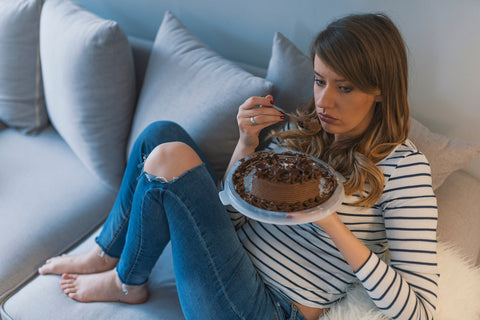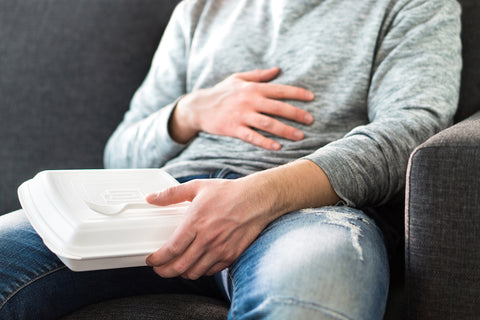
Quick Take
Ever feel down after pigging out? Zapped of energy and cranky after that greasy burger and fries? When you feel lazy and low after eating, it's your body's inflammatory response to junk food — and it can affect your mood. Here's what you need to know about depression and a plant-based diet (plus which foods to eat and which foods to avoid).
Before we begin: get healthy vegan meals (that actually taste good)
Feel your best and eat healthy at home, without all the work. Get antioxidant-rich and fully prepared meal foundations with the MamaSezz Get Me Started Bundle. Healthy vegan meals (you'll actually want to eat).
On this page
First, let's look at depression and inflammation
What you need to know about depression and a plant-based diet
How inflammation affects our gut, AKA our “second brain
The best + worst foods for your mood
Key takeaways
First let's look at depression and inflammation

First, Inflammation isn't necessarily a bad thing. It helps us heal from injury or infection.
For instance, when we are hurt or sick, our immune system sends armies of white blood cells to fight off the injury or illness and repair damaged tissue. As a result of this reactionary inflammation, we tend to feel tired, dopey, and down. Basically, we sleep a lot. All this inactivity allows our bodies to fight off infection without wasting energy elsewhere.
Be that as it may, while inflammation as a defense mechanism is a healthy and necessary response, chronic inflammation is not.
In brief, chronic inflammation happens when there isn't injury or illness. The problem is your body can't tell the difference so it still sends in white blood cells to attack healthy tissue instead. As a result you end up feeling tired, dopey, and down.
What you need to know about depression and a plant-based diet

What's all this have to do with diet?
The bad news: Inflammation can trigger depression and disease. It's important to realize that when we eat processed, fatty, and sugary foods we can send our bodies into a state of chronic inflammation and screw with our gut microbiome along the way. This does more than just make us feel sluggish — it can actually depression.
The good news: Antioxidants can help fight inflammation (and depression).
Why antioxidants matter when it comes to depression and diet
You've probably heard about antioxidants, right? We're here to tell you they're more than just a health food buzz word. In fact, antioxidants are the “good for you” nutrients found in dark and colorful plant foods. Their job is to stop oxidative stress from occurring by stabilizing free radicals (which are unstable atoms responsible for aging, tissue damage, and certain diseases).
In short, antioxidants calm inflammation, which in turn prevents disease, slows aging, and even reduces symptoms of depression.
Eating your antioxidant-rich foods are important, but knowing which foods trigger inflammation is key when it comes to depression and a plant-based diet.
Fatty foods high in trans fat and omega-6s (found in meats and refined oils), refined sugars, refined grains, and dairy products all cause inflammation. All these foods have few antioxidants to counteract their oxidative effects, so when we eat them we are left feeling sluggish and we are more susceptible to disease, including depression.
How inflammation affects our gut, AKA our “second brain"

You know how you feel a little down after binging on junk food?
In reality, gut health affects your mental health. And fiber seems to play a pivotal role on your gut health (and as a resu, your mental health).
Here's the deal:
Our guts and brains are connected by neurotransmitters that transmit chemicals between nerve cells during a process called synapses. These chemicals, like dopamine and serotonin, help control our emotions.

Our gut actually produces a ton of these neurotransmitters, specifically serotonin, or the “feel good” chemical.
And get this: high fiber plant foods increase your neuroplasticity, making that transmission during synapse more effective. That is why a healthy gut full of good bacteria can help your mood and reduce anxiety and depression.
The best + worst foods for your mood

First, the best plant-based foods for your health.
So now that we know there's a connection between depression and diet, what the heck do we eat to feel better? The easiest solution to reduce inflammation naturally is to load up on more vegan foods, like:
- Fruits, veggies, beans, and nuts are high in antioxidants and fiber, which leads to a healthy gut and healthy brain.
- Dark and colorful fruits and vegetables have more antioxidants. Go for berries, dark leafy greens, citrus fruits, colorful peppers, and spices.
Pro tip: Take a breath and know you can start small. Even adding some lemon juice to your water or a handful of raw spinach to smoothie in the morning can make a difference.
The worst foods for your mood
Eliminating inflammatory foods is another crucial piece of the puzzle. Try cutting out:
- fatty meats
- dairy
- refined sugars
- processed foods
Key takeaways on depression and a plant-based diet
- Depression and diet are linked. Chronic inflammation (and eating the foods that cause this) can hurt your physical and mental health.
- Good gut health can help battle depression.
- The best diet for depression? A colorful plant-based diet, high in antioxidants. Enjoy a WFPB diet, AKA a whole food plant based diet.
- The worst foods for depression? Standard American Diet fare, like fatty meats, dairy, refined sugars, and processed foods.
- You don't have to spend all day meal cooking to boost your brain health with diet. Get antioxidant-rich plant-based meals delivered to your door with the MamaSezz Get Me Started Bundle.
Order your MamaSezz Get Me Started Bundle today!
**
Updated 1/5/22 by the MamaSezz Team


